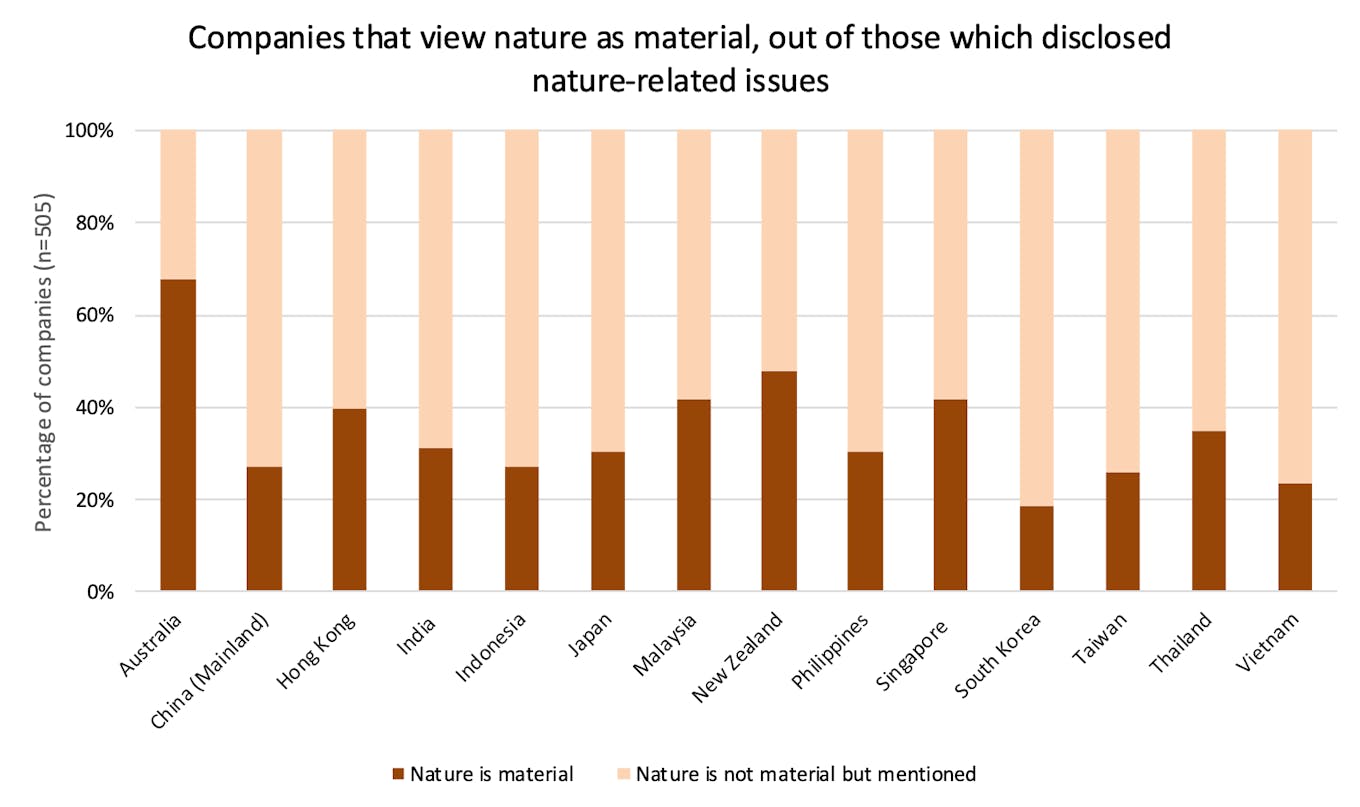The natural world provides the air, water, and materials that businesses need to survive – and yet for the biggest companies in the world’s most biodiverse region, the penny has been slow to drop that nature is critical to a healthy balance sheet.
To continue reading, subscribe to Eco‑Business.
There's something for everyone. We offer a range of subscription plans.
- Access our stories and receive our Insights Weekly newsletter with the free EB Member plan.
- Unlock unlimited access to our content and archive with EB Circle.
- Publish your content with EB Premium.
Of the most powerful publicly listed companies in Asia Pacific, 72 per cent identify topics such as water, biodiversity and ecosystem protection in their sustainability or annual reports, but only one quarter of this group considers these issues as material to their businesses, according to a study of 700 firms in 14 jurisdictions in the region.
Less than 40 per cent of the region’s biggest corporates disclosed how they are measuring their impact on nature, while only 30 per cent have set clear targets for managing nature-related issues.
About half disclosed the role of their board in overseeing nature-related issues.
“
Nature should mean more to business than adopting a giraffe at the zoo.
Professor Laurence Loh, director, Centre for Governance and Sustainability, National University of Singapore Business School
The study by Centre for Governance and Sustainability (CGS) at the National University of Singapore (NUS) Business School and luxury goods company Kering was based on the disclosure of the top 50 listed companies by market capitalisation in Australia, China, Hong Kong, India, Indonesia, Japan, Malaysia, New Zealand, the Philippines, Singapore, South Korea, Taiwan, Thailand and Vietnam.

Companies that view nature as material, by country in Asia Pacific [click to enlarge]. Source: CGS
It found that Australia and New Zealand were the most progressive markets for nature disclosure, with 68 per cent and 48 per cent of large companies in those markets, respectively, considering nature to be material to their businesses.
Singapore and Malaysia firms were the next most active in considering nature as material (42 per cent of firms in both markets). South Korean companies were the least likely to factor nature into business considerations (18 per cent).
Climate prioritised over nature
The findings reflect the nascency of nature-related reporting. In Asia Pacific, companies have focused on climate disclosure before assessing their impact on the natural world, an approach that mirrors global trends. Only 13 per cent of the firms studied disclosed their alignment with the Taskforce on Nature-related Financial Disclosures (TNFD), a standard for nature-related reporting that launched in 2023.
CGS director professor Laurence Loh said that to many large businesses in the region, nature still means donating to a conservation fund or sponsoring an animal at the zoo, rather than understanding the dependencies of businesses on natural resources, and the impact of business operations on the natural environment.
Smaller unlisted businesses, which are not featured in the study, are even less likely to consider nature as material to their business operations and products, he suggested.
Nature has been largely overlooked by businesses historically, because there has been little pressure from shareholders, investors or even consumers to consider its importance, Loh told Eco-Business.
“There has been no kick in the pants from anyone,” he said, adding that regulators have yet to squeeze businesses to disclose their impact on nature. By contrast, juridictions such as New Zealand, China, Singapore and Hong Kong now require listed firms to disclose their impact on the climate, which has been prioritised over nature.
“Climate is only half the story [for businesses],” said Loh. “Climate is the means not the end. The end is actually nature. But many markets have introduced climate policies first. The assumption has been that if climate change is well managed, nature will take care of itself – which does not tell the full story.”
Businesses should integrate nature-related considerations into their sustainability reporting to get “a comprehensive understanding of environmental risks”, Loh contended.
The report highlighted Singapore real estate firm City Developments Limited, Australian airline Qantas and Japanese conglomerate Mitsubishi as companies that have credible biodiversity policies, use tools to analyse nature impacts and integrated nature and climate into a singular sustainability strategy.
CGS’s report emerges three years after the Kunming Montreal Global Biodiversity Framework (GBF) set a target for governments to ensure that large companies and finance groups disclose nature-related risks by 2030.
Loh noted that the GBF was intended be the equivalent of the Paris Agreement for nature, but has failed to get the same traction as the landmark climate agreement forged in 2015. He proposed for negotiations to reduce carbon emissions and protect nature to be merged under the Conference of Parties, or COP, banner.
“How come we need two COPs – one for climate, and one in nature? Why can’t we just integrate them? They are ultimately about the same thing,” he said.
At the COP16 Convention on Biological Diversity in Cali, Colombia last November, participating countries could not agree on how to monitor biodiversity targets and fund the goals of the GBF.








